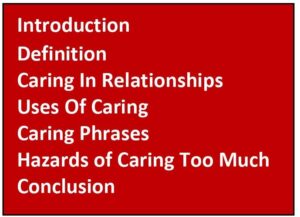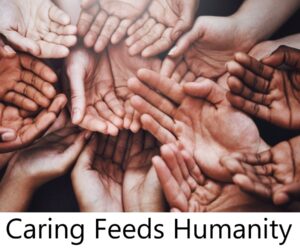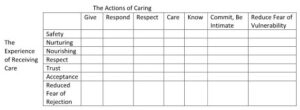Caring: Wonderful but Use With Caution
INTRODUCTION
The September Letter for Insight and Innovation discusses caring. Caring or not caring is something every human being does as a natural aspect of living. Being alive involves paying attention and caring is one of the motivations for paying attention to something. If we care we pay attention. The issue of what we pay attention to is so important because this is a matter of our moment-to-moment experience of our life. What we pay attention to is a main cause of how we feel and how we feel is our experience of life. If we fine tune our levels of caring we can better control our moment-to-moment experience.
Caring or not caring is a crucial part of relationships. Since we value relationships it is very useful to understand the interpersonal aspects of caring. We should also value our relationship with ourselves. Self-care is crucial for our well-being.
Point of Empowerment: Whatever we say about caring for others also applies to ourselves, to self-caring, caring for ourselves. Our self-care needs to be equal to or greater than our caring for others.
DEFINITION
Caring is an aspect of love. Both begin at a source and extend out into the world. Love and caring are both personal and impersonal. Personal in that they originate from within a person and are directed toward the object of love and caring. Impersonal love and caring exist as timeless values disconnected from a particular historical time or person and existing throughout history. The object of impersonal love and caring is something in general. I love and care about animals, people, art, theatre, or the earth, for example. Caring is concern for the wellbeing of something. We want to see the object of our caring do well. We care about, care for, and take care of. Caring about is not very intense and is more of an attitude. Caring for is more intense and is the starting place for the action oriented taking care of.
impersonal. Personal in that they originate from within a person and are directed toward the object of love and caring. Impersonal love and caring exist as timeless values disconnected from a particular historical time or person and existing throughout history. The object of impersonal love and caring is something in general. I love and care about animals, people, art, theatre, or the earth, for example. Caring is concern for the wellbeing of something. We want to see the object of our caring do well. We care about, care for, and take care of. Caring about is not very intense and is more of an attitude. Caring for is more intense and is the starting place for the action oriented taking care of.
Point of Empowerment: Caring exists in varying degrees of intensity.
CARING IN RELAITONSHIPS
Caring in our relationships has two components, giving and receiving care. Giving care involves behaving in a certain way, which varies according to the degree of intimacy in the relationship. Simple caring is acting in a way that takes care of the needs of the other person. In intimate relationships caring actions and reactions are more complex. What do we do (our actions) to express caring? Here, from a broader perspective, is a useful list of actions that help us further define the process of caring. The actions of caring are to give, respond, respect, care, know, be willing to commit and be intimate, and to reduce the fear of vulnerability. How can a person respond to receiving the actions of caring? The person receiving caring actions has the opportunity to experience safety, nurturing, nourishing, respect, trust, acceptance, and reduced fear of rejection. You can look at the chart below to get an understanding of the complexity this definition of caring and return at some future time to put your understanding into practice.
Point of Empowerment: A more complex description of caring allows for a richer experience of caring with many nuances and subtleties.

Consider an example of using the chart. You tell me about an experience you had. I listen seeking to know more about you. I hope that you feel nourished by my seeking to know more about you. Also, if I listen with respect you can feel accepted.
hope that you feel nourished by my seeking to know more about you. Also, if I listen with respect you can feel accepted.
Practice: Understand and learn about the different aspects of caring. Act on an action and ask the recipient of your caring how they feel in response to what you have done.
Practice: Chose a day where you as the care giver practice one of the actions of caring. The receiver of your actions focuses on responding with one of the experiences of receiving care. Switch giving and receiving the next day choosing different actions and experiences.
USES of CARING
The primary use of caring is simply to care as we have defined it. As we see from the above discussion, caring is an integral, intimate, rewarding, and fulfilling part of relationships. Another use for caring is to help us with our emotional self-regulation, to manage our feelings. Also, it is a sophisticated way to manage our attachments, commitments, involvement, and interests. There is a relationship between caring and interest. If you care, you are interested. If you are interested, you care. We also use caring for other purposes, expressions, and meanings. Let’s look at some caring phrases to see how regulation, management, purpose, expression, and meaning happens.
CARING PHRASES
- “I care about you,” expressed genuinely means exactly that. I care about you.
- “I care about you,” when said with honesty is a genuine expression of caring. There can be love and intimacy mixed in.
- “I care about my partner’s or my child’s well-being,” is an expression of caring and love.
- “I care about my appearance,” expresses pride, concern, and possibly anxiety about how I appear to other people.
- “I care about the environment,” is an expression of genuine caring or feigned caring that is not really there.
- “I don’t care,” expressed with varying degrees of emphasis creates emotional distance from what we don’t want to care about. We have appropriately or inappropriately reduced our caring. Appropriately because we have cared too much. Inappropriately because we need to care but refuse to, like caring about the quality of our work, for example.
- “I don’t care,” has reduced the intensity of our interest. Appropriately because we had become obsessed. Inappropriately because we gave up out of frustration when we needed to persist, follow through, and stay interested.
- “I could care less,” expresses intense not caring. Sometimes this phrase has contempt mixed it. It points to a direction of additional “not caring.”
- “I couldn’t care less,” indicates that you have reached an appropriate level of caring, though this is sometimes said with contempt, anger, and/or relief.
- “What do I care?” expresses not caring and adds a puzzled, confused attitude.
- “Who cares?” expresses not caring and amazement that anyone could care.
- “I care about you,” expressed in a tone of voice, with certain body language, and within a certain context actually means not caring. This is used as a manipulation to confuse another person. Used as a manipulation: we have hurt someone but manipulate them with a statement like, “I did this for your own good because I care about you so you can’t be angry at me.”
HAZARDS OF CARING TOO MUCH
We said that caring is expressed through actions that create emotional states in the person who receives the caring. What if your expression of caring is rejected or the person is incapable of receiving your caring? The other person refused it by not letting it in or by actively pushing it away. The other person does not have the maturity that produces the skill of accepting the caring actions of the care giver. If you persist in caring you will become frustrated and possibly angry and resentful. The experience of giving and receiving caring is an activity of mutuality. If that mutuality is not there for one reason or another and you persist with caring actions, you are caring too much. To recover peace of mind it is necessary for you to reduce the amount of your caring.
Point of Empowerment: The experience of giving and receiving caring is an activity of mutuality, a mutuality that brings people together by increasing intimacy.
Point of Empowerment: If the person you care about rejects your caring, substitute compassion for the caring.
There are situations where you care about something but are powerless to affect the situation. If you persist in caring in these situations you will generate frustration, anger, and pain for yourself. It is necessary for you to distance yourself from this kind of situation by reducing or maybe eliminating your caring. For example, you overestimate the importance of a relationship that you have. This other person is not interested in you, does not care about you. Caring about this person is unwise and reducing or stopping your caring preserves your wellbeing. Or caring about current events is a good thing but being powerless to effect change suggests that you should adjust your caring unless you become active in a way that produces change. Sometimes we exaggerate the importance of an aspect of ourselves and therefore care too much about it. Our appearance or wanting to please others are examples of this. Finally unrealistic hope creates a caring that is continually frustrating. Become more realistic with your hope. For example, I hope my friend will be more available to spend time with me, but this friend has a busy life that tends to exclude me. Let go of that hope and become less caring about his friend.
Practice: Become aware of a situation where you care but your caring only generates pain for you. Adjust your caring to regain you own wellbeing.
CONCLUSION
In exploring caring we have seen that it can be simple or complex. We described various uses for caring. This discussion can empower a person if he or she understands caring and puts it to good use. Working with the complexity, nuances, and subtleties of caring can enrich our lives.
